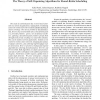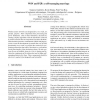20 search results - page 2 / 4 » Self-Organizing Sleep-Wake Sensor Systems |
92
Voted
SASO
2007
IEEE
15 years 6 months ago
2007
IEEE
The study of synchronization has received much attention in a variety of applications, ranging from coordinating sensors in wireless networks to models of fireflies flashing in...
106
click to vote
ARCS
2005
Springer
15 years 5 months ago
2005
Springer
Data fusion concepts are a necessary basis for utilizing complex networks of sensors. A key feature for a robust data fusion system is adaptivity, both to be fault-tolerant and to...
108
click to vote
GECCO
2005
Springer
15 years 5 months ago
2005
Springer
This article describes a mathematical framework for characterizing cooperativity in complex systems subject to evolutionary pressures. This framework uses three foundational compo...
SASO
2007
IEEE
15 years 6 months ago
2007
IEEE
The future mass deployment of pervasive and dense sensor network infrastructures calls for proper mechanisms to enable extracting general-purpose data from them at limited costs a...
SASO
2008
IEEE
15 years 6 months ago
2008
IEEE
Wireless sensor networks are designed for a very wide, yet specific, purpose. Their components have processing and power limitations. Due to these limitations, decisions by runni...


